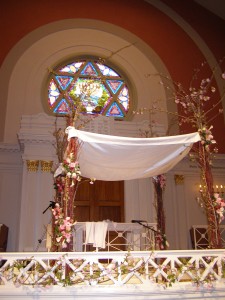
It has been noted that there really are no Conservative Jews, just Conservative rabbis. Last year a poll of Conservative rabbis revealed that 40% of them would officiate at interfaith weddings. This led me to wonder whether even the existence of Conservative rabbis would soon be in question.
They’re probably not going to disappear all that quickly. The poll was deeply unscientific so it’s meaningless as an indication of where Conservative rabbis are on the issue. It was conducted by the outreach organization Big Tent Judaism and only included a self-selecting group of 249 (out of 1,700) Conservative rabbis.
Still, the fact that there are even one hundred Conservative rabbis out there who want to perform these ceremonies gives one pause. It wasn’t too long ago that the number would have been zero.
Rabbi Adina Lewittes followed through on her determination to officiate and consequently is no longer considered a Conservative rabbi. She wrote about the experience last year for Tablet Magazine.
For the first 20 years of my rabbinate I turned away interfaith couples who asked me to marry them. I believed it my professional duty to do so. But telling someone that I won’t do their wedding because I disapproved of their life partner increasingly chafed against my calling to engage Jews with their heritage. Judaism isn’t mine to offer or withhold at will. I don’t own it.
Despite her laudable decision to end her personal ban on these ceremonies, Rabbi Lewittes proceeds to demonstrate the ways in which she does offer and withhold Judaism. She admits that she carefully chooses her couples, immediately rejecting the ones who “just wanted the optics of a Jewish wedding.” (There’s an argument to be made that all human rituals are simply “optics” applied to a specific need or situation.)
She also admits that she doesn’t really conduct Jewish ceremonies for these couples. At least not according to her own interpretation of Judaism:
I wouldn’t perform a Jewish ceremony for them with the traditional rituals of a ketubah, the Mosaic ring formula, and the seven wedding blessings. To me, those are historic, holy elements reserved for two Jews.
…What I created with them wasn’t Kiddushin—the ceremony reserved for two Jews.
Even with all of her hemming and hawing and stipulations and constraints, I applaud her decision to accept reality, even if she refuses to acknowledge that what she is doing is accepting reality:
They recognized I’m not out there to accommodate reality; I’m trying to transform it into meaningful Jewish lives.
This is based upon her understanding of the significance of her presence, namely that:
… being present to another to make manifest the singular, sacred, if messy, essence of life, transcending all particular religions and identities, and binding us to one another and to the divine.
I’m not really sure I understand how she transforms reality into “meaningful Jewish lives” while simultaneously “transcending particular religions and identities.” But that might just be another case of my lifelong inability to understand fancy theistic talk (which is what got me to Secular Humanistic Judaism in the first place).
In any case, as a ceremonialist being “present” is certainly a key to the service I provide. However, as a Secular Humanist I believe that my presence at a wedding ceremony is not for the purpose of transforming people into something I desire, but to celebrate who they already are and what they desire. Isn’t that the whole point of a wedding? To celebrate their choices, their love, their commitments, and their lives.
My theistic colleagues tend to forget this. Maybe that’s why so many couples are eschewing clergy in favor of their internet-ordained friends.















